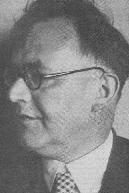Heroes of the Faith
Concise stories of significant Christian leaders
Concise stories of significant Christian leaders

 Karl Barth
Karl Barth1886-
———————————————————————
Born at Basel on May 10 1866, Karl Barth was educated at Bern, where his father taught New Testament and church history from 1889. He also studied theology in Berlin, Tübingen, and Marburg. Ordained in 1908, he spend a year in Marburg, took up an assistantship in Geneva (1909-1911), then pastored the small industrial parish of Safenwil in Aargau (1911-1921). Here he plunged into trade union matters, wrestled with the demands of preaching God's Word, and saw his liberal theology collapse under the pressure of World War I.
Turning to Scripture he wrote his commentary on Romans, which in its revised second edition rocked European theology, challenging its methods of Biblical criticism and stressing God's transcendence and grace. A new sphere opened up for Barth with a call to a professorship at Götingen (1921), then at Münster (1925), and later at Bonn (1930). During this period he wrote extensively and gathered a group of supporters who would form the nucleus of what is often called "neo-orthodoxy."
By 1933, he had to give much attention to the church conflict with Nazism. In 1934 he drew up the Barmen Declaration. This was the rallying point of what is called the Confessing Church who opposed the so-called German Christian Church which at first reflected the ecclesiastical policies of the Nazi dictatorship. In each of the six main paragraphs of the Declaration New Testament texts are given, then positively expounded; and contrasting errors are repudiated. Its thrust is that, since Jesus Christ in the one Word of God, the Church is not to recognise other events, powers, or images alongside him as divine revelation.
Barth's stand led to his dismissal from Bonn (1935). The issues were his resistance to an unqualified oath of loyalty to Hitler and his refusal to open classes with the Hitler salute instead of a hymn and prayer. A timely vacancy at Basel enabled him to spend his remaining years in his native land and city.
At Basel, Barth continued his opposition to Nazism with courses on the confession, discussion of the political service of God, sponsorship of relief for refugees, and vocal support for the Allies in World War II (in defiance of Swiss neutrality).
Physical infirmities hampered Barth after his 1962 retirement, but he continued to write, teach, and preach as health permitted. On the eve his death, December 9, 1968, he had broken off in mid-sentence. He died peacefully, hands folded for prayer, confident that God would reign and that by God's promise he would stand as a justified sinner.